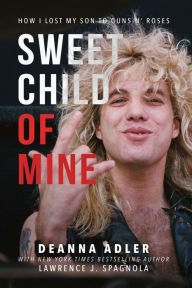Deanna Adler, Mother of Steven Adler, former drummer with Guns N’ Roses has a new book out called “Sweet Child Of Mine.” Our new contributor David Weitz, interviewed her recently in New York about her book, her early life and what it was like having her son addicted to drugs.
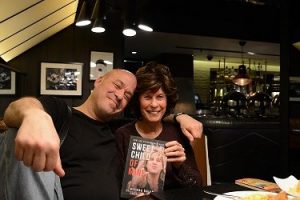
I met Deanna Adler in the lobby of the Paramount Hotel in Times Square on a Friday morning. I instantaneously gravitated towards her as she walked off the elevator and kindly introduced myself. Her smile was warm and loving, just like my own mother’s. She expressed to me how famished she was and asked if I would join her in the hotel restaurant for breakfast. How could I refuse such a wonderful invitation? The restaurant was completely vacant as we made our way to a beautiful round booth by the window in the back. As I unloaded my belongings into the booth to which we were about to sit in, Deanna began to cry.
“What’s the matter, Deanna?” I asked as I reached for her hand to try comfort her.
“Everyone has just been so kind to me during this trip,” she explained.
“That’s a good thing isn’t it?” I asked.
“Yes, it is. This is just the first time I’ve ever done anything like this,” Deanna added.
I asked if I could excuse myself for a moment and took a minute to go and pray. When I returned, I took all of my notes that I had prepared for this interview and put them back into my bag. I realized that this interview with Deanna Adler served a much greater purpose to which I was only an instrument. I had to keep reminding myself that God was the one in charge, not me.
We got comfortable and Deanna ordered her breakfast. When it arrived, we both lifted our cups to take in some coffee and she began to divulge. I did not know what to expect without my notes, but I just continued to remind myself that I was merely just an instrument. I took in a deep breath, hit record on my iPhone app and we began to dig deep.
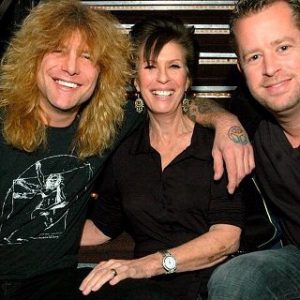
“Deanna, you mention in your book that the relationship with your mother was that of a child who was never loved. How has your childhood affected the relationships you have with your with own children?”
“I didn’t want to raise my children the way my mother and father raised me. I never heard from my mother that she loved me. My parents never touched me, or hugged me. So, I always said to myself, if I ever have children I am going to tell them everyday that I love them. And I am going to hug them, and kiss them everyday. And that’s what I’ve done.”
“So, when the relationship of your first marriage ended and you showed up at your mother’s doorstep knowing that you were desperate for her help, was it really a nightmare because of the conditions that she placed on you?”
“It was a nightmare, but I was so naïve and so scared. I was so young and I didn’t know what to do. My mother had the attitude, ‘you’re going to do what I want you to do, or I won’t help you.’”
“And how did that make you feel?”
“What mother says to you, ‘I’ll help you, but you gotta give me the baby’? What is that all about? Why couldn’t she just have said, ‘Don’t worry, Deanna, I’ll help you.’ My mother said she would only help me if she could have Steven.”
“And part of the conditions your mother put on you were to change Steven and Kenny’s name because you married outside of Judaism and their biological father was not Jewish and they were named after their biological father and grandfather who were Italian?”
“Yes, she made me change their names, but I didn’t have a penny to my name, and I didn’t know what to do! I was raised like an animal. I didn’t know anything, so I let her do what she wanted to do. It was a mistake!”
“So, when Steven started showing signs of having behavior problems early in his life, did you feel compelled to react the opposite way to him that your mother did to you, even though at times throughout Steve’s addiction his behavior was so disturbing to you and your family?”
“I never once thought to quit on Steven. You see, the thing that people don’t understand is that when you have a son that’s a drug addict, or an alcoholic, there’s nothing you can do for him except be there when he needs you. That’s the only thing you can do. It took me many years of nagging him, and pressuring him to go to rehab. It didn’t work; it only made our relationship worse. So, I finally learned that I needed to let him be who he is. He would say to me, ‘when I’m ready to quit, ma, I’ll quit! No matter how much you nag me, or manipulate me, I will quit when I’m ready! Not when you say, or anyone says!’ So, I stopped, but I was always there for him.”
“So, how did it make you feel when Guns N’ Roses were at their peak and you didn’t see Steven for long periods of time knowing how bad his drug addiction actually was?”
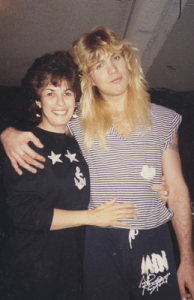
“Sometimes, there would be times where we wouldn’t see him for months, even years at a time. And I would always tell Jamie, ‘Don’t worry about it. Your brother is just going through a rough time.’ I mean, if you think I had it bad, how do you think Jamie felt having a ‘rock star brother’?”
“So, how did Jamie feel during those times?”
“Well, Jamie was always proud of his brother. It was only after Steven was thrown out of Guns N’ Roses that Jamie came home one day from high school and told me that someone made a gesture to him of somebody shooting up which made Jamie feel really bad.”
“Deanna, all mothers want to see their children succeed, but actually witnessing your sons success at the level that he succeeded is unlike anything most mothers will ever witness whose children are drummers in a rock band. With that thought in mind, why did you choose to subtitle your book, ‘How I lost My Son to Guns N’ Roses?’”
“Well, I actually didn’t lose my son to Guns N’ Roses, I lost my son to drugs. He just happened to be in Guns N’ Roses at the time. But in reality, the subtitle of the book was just for publicity purposes.”
“Other mothers who are currently experiencing what you lived through might say that you’re different than they are, because of your son’s celebrity. What would you want to say to every mother that is going to be reading this article?”
“The only difference between every mother who has a son who is a drug addict and me is that maybe a handful of people know that their son is a drug addict. With me, thirty million people know my son is a drug addict. That’s the only difference between us. Other than that, we’re all alike, we all feel the same, and I’m no different than they are. What I wrote down in my book is what every mother wants to say, but most are too ashamed, or in denial to admit it.”
“So, what would you tell a mother who is grieving right now who just lost their son to a recent overdose?”
“I would tell them that it’s not their fault and they shouldn’t feel guilty. When you’re a grown man, you can’t control them. They know what they want to do. It’s very sad. It’s the worst thing in the world to lose a child.”
“And what would you tell a mother who is currently battling an addiction with their son who is still alive and living at home?”
“First of all, I don’t think I could live with my son if he was using drugs, but I never had to. But, if a child has to be in the house, my advice is just be there for him. Try your best and guide him. It’s just such a terrible situation to be in, you really don’t know what to do! But, all you can really do is just be there for him. That’s all you can really do.”
“After reading your book, I know over the decades you have also experienced being an enabler  while you battled Steven’s addiction. What would you tell the thousands of mothers who enable their children that are strung out on drugs, who with the best intentions thinking they are actually helping them?”
while you battled Steven’s addiction. What would you tell the thousands of mothers who enable their children that are strung out on drugs, who with the best intentions thinking they are actually helping them?”
“Well, they’re not helping them. They’re actually making things worse.”
“So, how do you feel about a program like, Al-Anon?”
“I think it’s great! I never wanted to go to an Al-Anon meeting. And my daughter-in-law, Steven’s wife, she kept saying to me, ‘Go to an Al-Anon meeting.’ And I would say to her, ‘No, I don’t want to go to a meeting and hear anyone else’s problems, I have enough problems of my own! So, finally, I went to one and you know what, I felt so much better when I walked out the door, because I said to myself, ‘Oh, my god, I don’t have it as bad as these other people have it.”
“And why the sudden change of heart about everyone else’s problems?”
“You see, I’ve been lucky. My son has money. These mothers whose children are on drugs have to see their children committing crimes to get their drugs, because they run out of money. They have to see their child on the street and begging for drugs. I’ve never had to deal with that.”
“So, do you feel that being an enabler is a sickness, similar to the actual drug addict seeking another fix?”
“Yeah, it really is, because I was an enabler. Oh, the terrible things that I’ve done! I used to take Steven to his dealers house!”
“And you also took him to the methadone clinic every morning too, correct?”
“And that’s another thing! To me, methadone is just legalized heroin! I would say to my husband who was an invalid, ‘I’m going to put on the television. Just lay in bed and I’ll be back in an hour. Then, I’d go and take Steven to the methadone clinic. Every walk of life went into that clinic! Businessmen, housewives, people with beautiful cars, people with junky cars. And I thought to myself, you don’t even know who is on drugs! You don’t know what anyone is taking, or doing! So, I would take him to the clinic and then I’d take him home. And just a little while later, I would drive by his house and his drug dealer’s car would be in the driveway! I would pretend like I didn’t know anything, but I knew.”
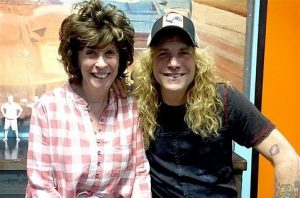
“Deanna, let’s shift the conversation and talk about hope. You mention in your book multiple times that the best is yet to come. After the decades of battling your own demons and also learning to cope with Steven’s, has the best yet arrived, Deanna?”
“Yes, it has! The best is here, because I finally have my son back. He is completely off drugs, and every morning he gets up and the first thing he reads are the ‘Four Agreements.’”
“Why don’t you tell my readers what the Four Agreements are?”
“The Four Agreements work for Steven. He lives for them and brings the book everywhere he goes! He doesn’t read the entire book everyday, but he reads a little each day. The agreements he lives by are: Be impeccable with your word. Don’t take anything personally. Don’t make assumptions. And, always do your best. This he reads every single day! In fact, sometimes, when we do an interview together, he brings the book with him, because he wants to show whoever is interviewing him that there are ways of staying sober rather than a 12 step program.”
“Tell me about your family life now, Deanna?”
“It’s like night and day. We all meet at the gym every morning. Either I drive Steven, or Jamie drives him. We laugh, we talk, and he teases me. He’s the funniest guy in the world and he’s also the sweetest guy in the world, too. I am just so glad he is okay.”
“Throughout this entire journey, how important do you feel that being patient has been?”
“You have to be patient. You can’t rush anything. You have to be there for your children, even if they shit on you. I always believe that God never gives you anything more than you can handle. As a recovering drug addict, you can only take your life one day at a time, because you just don’t know what tomorrow brings. And today, it’s the best it’s ever been.”
Currently, the fatality rate for accidental overdoses amongst the youth in the United States is higher than it’s ever been. Parents of adolescents from around the country are placing themselves in situations that are beyond baffling. The endless trips into an abyss for so many that are unprepared for such self-destruction is as life threatening for the families that are living it as it is for the ones who are hooked.
Deanna Adler might be the mother of a famous drummer whose son saw celebrity and fortune on a level many may never know, however, her story that stemmed decades with Steven’s drug addiction is sadly the same story as the mother whose son that will never make it to the front cover of Rolling Stone. The audacity and determination that are essential to stay persistent on a road of countless disappointments require courage and strength that can only be obtained by ultimately realizing that you cannot survive it alone. Extending your hand for help cannot only ease the pain of the shame that weighs so heavily on the hearts that are burdened by this horrifying epidemic that’s plaguing our nations families. It can also increase the chances of an earlier recovery for both the family and the addicted. It may all seem so overwhelming at first, but in the end, all you really need is just a little patience.


